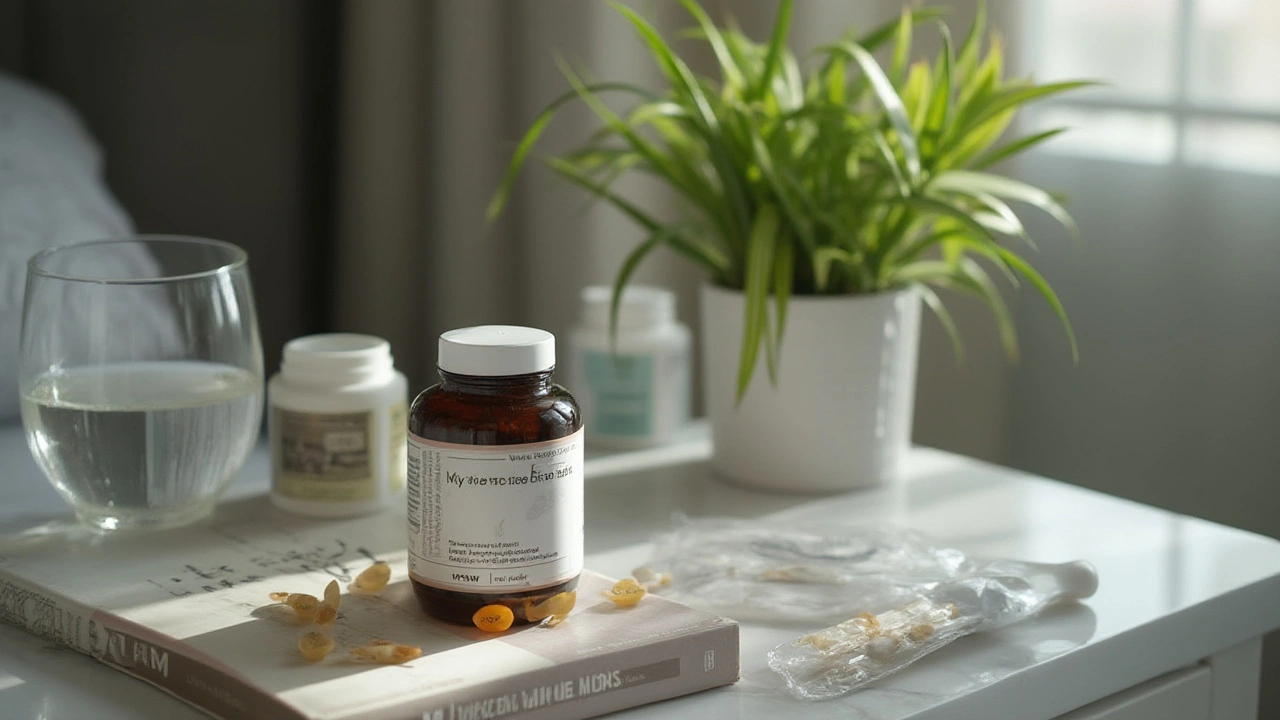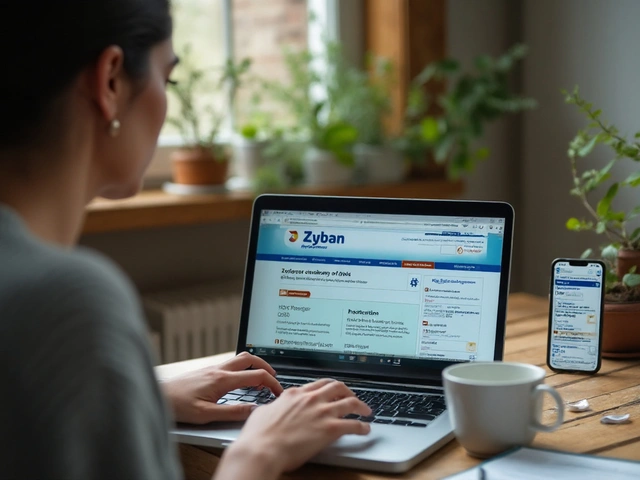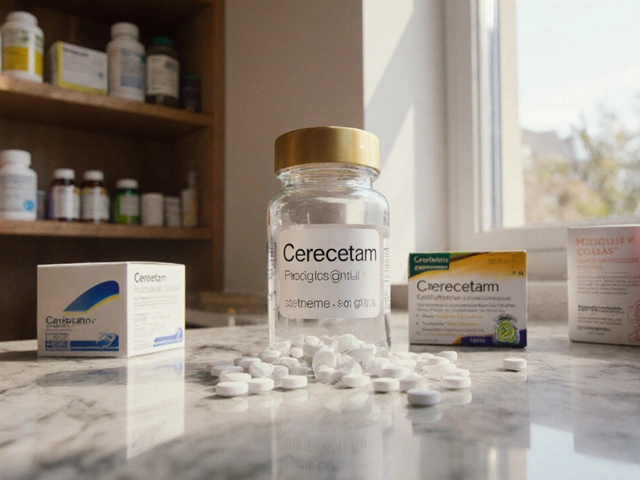If you're one of the millions who has dug through the medicine cabinet at midnight looking for relief from a pounding heart and anxious thoughts, you've probably seen that little pink box—Benadryl, or diphenhydramine. Even though it's mainly for allergies, lots of folks grab it when they're desperate for sleep or something to quiet their nerves. But here's the kicker: diphenhydramine can hit you with side effects that make you wonder if the relief was even worth it. We're talking fuzzy thinking, dry mouth, grogginess that ruins your next day, and even memory trouble over time.
You don't have to pick between feeling anxious and feeling like a zombie. There are safer, easier-to-find options out there that work with your brain and body—without the risky baggage. Today, let’s walk through the top seven over-the-counter options that are easier on your system than diphenhydramine if you’re battling anxiety. Some you’ll find in the vitamin aisle, others might be familiar allergy meds with less drama. Let’s make sense of what works, what’s safe, and why these choices just might help you actually feel better—without trading one problem for another.
L-Theanine and Magnesium: Gentle Powerhouses for Calming the Mind
L-theanine is that quiet hero hiding in your cup of green tea. Scientists love it because it seems to boost calming alpha brainwaves without making you drowsy. A study out of Japan showed that folks who took L-theanine felt less stressed—without that weighted blanket feeling that comes from sedating drugs. It’s even getting used in some workplaces to help employees stay focused and mellow. You can grab it in the supplement aisle, but double-check the dose (most studies use around 100–200 mg, sometimes higher, taken once or twice daily).
Magnesium is another simple yet mighty option. Did you know roughly half of adults don’t get enough magnesium in their regular diet? That’s a problem because magnesium helps regulate the nervous system. When your levels are low, your body can be primed for anxiety, muscle cramps, even insomnia. Choose forms like magnesium glycinate or citrate since they absorb well and don’t cause as much stomach upset. Some people swear by an evening magnesium drink—the kind you mix with water—and notice their headaches, jitters, and trouble sleeping fade away after regular use.
If you want to stack your odds, you might try combining L-theanine and magnesium. There’s no magic bullet in the anxiety world, but these two have got more science behind them than most. They’re easy to find, not expensive, and generally safe, as long as you stick to recommended amounts. If you’re on other medications or have kidney issues, always run your plan by your healthcare provider first.
Want some numbers? Here’s a quick breakdown you might find useful:
| Supplement | Typical Dose | Main Benefits | Estimated Time to Notice Effects |
|---|---|---|---|
| L-theanine | 100–200 mg | Calm focus, less stress | Usually within 30–60 minutes |
| Magnesium Glycinate | 200–400 mg | Better sleep, less muscle tension, lower anxiety | Several days to weeks for clear effects |
If you’re tracking symptoms, jot down how you feel on anxious days and when you start these. Sometimes it takes a few weeks for the changes to really stick.

Antihistamines With a Lighter Touch: Options With Fewer Side Effects
Not all antihistamines are created equal. Diphenhydramine (Benadryl) is infamous for doing a number on your brain, thanks to its high anticholinergic activity. That’s nerd speak for side effects like confusion and sluggishness—stuff you want to avoid if you actually need a clear head. Luckily, several over-the-counter antihistamines don’t pack the same punch in the side-effect department. They still chill out allergies, and some anecdotal reports say they can even take the edge off mild anxiety, especially when allergies and anxiety go hand in hand.
Here’s the short list:
- Loratadine (Claritin): Non-drowsy, low anticholinergic action. People use it daily for allergies and rarely feel sedated. It doesn’t cross into the brain as much, so you don’t get that heavy fog.
- Cetirizine (Zyrtec): A little more likely to make you sleepy than loratadine, but still way less than the old-school meds. Many find it’s a sweet spot if you want a hint of calm but still need to function.
- Fexofenadine (Allegra): Practically zero drowsiness for most people. If you’re sensitive even to Zyrtec, Allegra can be a good pick. No anticholinergic side effects to worry about.
Sure, none of these are officially approved to treat anxiety, but they don’t cloud your mind like diphenhydramine. That’s a big deal if you need to stay sharp at your job or keep up with kids. Check out more on how each option stacks up—including details on over the counter antihistamine for anxiety—from sources that really break it down.
| Antihistamine | Drowsiness Potential | Main Benefit | Anticholinergic Risk |
|---|---|---|---|
| Loratadine | Very low | Non-drowsy, good for daily use | Minimal |
| Cetirizine | Low to moderate | Mild calming effect | Minimal |
| Fexofenadine | Lowest | Clear head, safe long-term | Minimal |
A smart move? Use these only when anxiety overlaps with allergy symptoms, or if you’re looking for something that won’t mess up your memory or thinking skills. If you feel jittery or wired on coffee, these newer antihistamines won’t amplify it the way diphenhydramine might.
One tip that’s popped up from people trying these: take antihistamines in the morning if you’re worried about drowsiness, and don’t mix and match. They don’t work overnight like sleep aids, and stacking several just raises your risk for side effects without more benefit.

Other Natural and OTC Choices: Melatonin, B Vitamins, Valerian, CBD, and Passionflower
L-theanine and magnesium aren’t the only kids on the anxiety block. Other over-the-counter and natural supplements show promise—especially for restless nights, racing thoughts, or moments when anxiety refuses to be ignored. You’ll find these in most drugstores, but the results can be hit or miss depending on how your body responds.
- Melatonin: While famous for sleep, this hormone also calms you down as your brain preps for rest. For folks who get anxious at night, a low-dose melatonin (start with just 0.5 to 1 mg) can help reset your routine. Skip high doses—they can backfire and leave you groggy.
- B vitamins: If you’re always run down, irritable, or stressed, a B-complex can fill the gaps. Things like vitamin B6, B9 (folate), and B12 are key for healthy nerves and more balanced mood. Most people feel more energetic and less frazzled after a few weeks.
- Valerian root: Known for its funkier smell, valerian is backed by research showing it can take the edge off anxiety and sleeplessness. Don’t expect knockout effects, but some find it useful as an add-on before bed. Go slow—a small percentage of people notice weird dreams or stomach upset.
- CBD (cannabidiol): Still trendy, and, honestly, the data is mixed. Some folks report seriously feeling less anxious with a low dose (like 10–25 mg), while others get nothing but a lighter wallet. If you want to try CBD, look for products that third-party labs have tested, and start small.
- Passionflower: This quirky herbal option actually has a few solid studies behind it. It works a bit like certain anxiety meds by boosting GABA in the brain, which slows racing thoughts. Capsules, teas, or tinctures all show promise, but start with a low dose to see how you feel.
If you’re curious about how these compare, use a journal or even your notes app to track what you try, how much you take, and how you feel the next day. Avoid using several new things at once so you can tell what actually works.
There’s a trick to experimenting with OTC anxiety fixes: be patient, don’t give up after one try, and keep your regular healthy habits going (think: regular exercise, decent sleep, and some form of daily downtime). Supplements aren’t a magic potion, but picking the right, safer ones can help you steer clear of the nastier side effects of drugs like diphenhydramine. And that alone could make your anxiety journey a little less bumpy.








Alexia Rozendo July 17, 2025
Oh sure, because nothing screams anxiety relief like scanning the shelves for "gentle antihistamines." Honestly, if I had a dollar for every time someone recommended diphenhydramine and it felt like a zombification ritual, I'd be rich. L-theanine and magnesium sound like the calm cousins that maybe didn't get invited to the party but definitely should have.
Has anyone here tried all seven options from the list? I’m curious which ones genuinely deliver the calm without turning you into a couch potato. And seriously, the groggy side effect we’re all trying to avoid is a dealbreaker. I'm all ears if someone has a secret miracle pick!
Kimberly Newell July 21, 2025
heyyy, this post is actually super helpful cuz i’ve been avoiding diphenhydramine just ’cause it knocks me the heck out. plus, u kno, sometimes i just wanna chill without feeling like i got hit by a truck the next day.
magnesium’s been my low-key hero lately. just popping a supplement in the evenings makes a difference, even if it’s subtle. tho gotta say the best part’s the NO groggy after-effects. lol.
what i really wanna ask tho - any ideas on where to get these safer options that aren’t super expensive? bc some supplements can be mad pricey and honestly, not everyone’s got that kinda cash lying around.
Drew Burgy July 26, 2025
Alright, you wanna talk about safer alternatives but here’s the thing – diphenhydramine being so mainstream is kinda suspicious, right? I mean, big pharma pushes this stuff knowing it messes with your brain and yet it’s still OTC. Yeah, sure, L-theanine and magnesium sound chill, but who’s to say those gentle antihistamines aren’t part of some bigger surveillance plan?
Plus, some of these OTC meds have hidden side effects no one talks about because hey, money talks. Anyone else feeling like we’re just swapping out one chemical mix-up for another? Just saying, it might be worth looking at lifestyle tweaks too instead of popping pills.
Jacob Hamblin July 30, 2025
Hey folks, just wanted to chime in with a little perspective from the grammar bulletin board, but also from someone who’s been through the anxiety wringer.
It’s important to not just jump on alternatives blindly. Magnesium, for example, can interact with other medications or conditions, and dosing matters a lot. L-theanine has some promising calming effects but should be part of a broader anxiety management plan—not a standalone hero.
I appreciate the focus on avoiding grogginess because it’s frustrating when meds take more from you than they give. And yes, knowing the difference between gentle and harsh antihistamines is key. Anyone here tried combining some of these options with mindfulness or therapy?
Andrea Mathias August 3, 2025
This list sounds like it was put together by someone with 0 understanding of what anxiety REALLY feels like, considering diphenhydramine a villain but then pushing antihistamines as alternatives? Please. These are just mild sedatives or patches on bigger mental health issues.
If you’re gonna suggest alternatives, at least throw in something substantial like cognitive behavioral therapy or proven anxiety meds that aren’t OTC but actually effective without the nonsense side effects. Otherwise, this is just a cosmetic facelift over toxic hype.
Pretending magnesium and theanine are the holy grail of anxiety relief? Nah, that’s just an insult to people struggling with real anxiety and chronic conditions.
TRICIA TUCKER August 6, 2025
I’m really glad this post brought up safer options! Diphenhydramine has been a no-go for me because of the side effects, so this is refreshing.
Personally, I’m a big fan of combining magnesium supplements with a good CBD tincture, and honestly, when I do that along with breathing exercises, it seriously helps to chill me out without the groggy aftermath. Best part – no hangover feeling.
Anyone else find natural supplements super underrated? I think we need to talk more about how to safely integrate them, especially since mental health is so important and everyone’s body reacts differently.
Dave Tu August 10, 2025
Honestly, while I appreciate the suggestion of alternatives, I remain skeptical of so-called "natural" remedies. Magnesium and L-theanine are fine, but how often do people blindly consume these without proper diagnosis or knowledge of their health status? OTC doesn't mean safe for everyone, and there is a massive danger in self-medicating without medical oversight.
Besides, describing antihistamines as gentle is a stretch considering their anticholinergic effects which can accumulate and cause long-term cognitive issues. We should be advocating for evidence-based treatments, not just safer 'feel-good' OTC options.
That said, direction towards less harmful options than diphenhydramine is a good start for casual anxiety relief.
Johnna Sutton August 13, 2025
omg u guys seriously are underestimating the real deal here. diphenhydramine isn’t just a sleepy pill, it’s part of a much bigger scheme to dumb down the masses. switching to these OTC fluff options like theanine? please. it’s just a soft poison in disguise.
Everyone’s ignoring the fact that the government and pharma are working hand in hand with agenda to keep ppl dependant on these quick fixes rather than focusing on true wellness. if u want to be free from this toxic cycle, u gotta go way beyond OTC meds and dig into your lifestyle, diet, and mental freedom tactics. no amount of magnesium will set you free if you’re trapped in a system designed to keep you docile.
Wake up, people!
Vinay Keragodi August 14, 2025
This is quite an interesting topic! I find the balance between effective anxiety relief and avoiding drowsiness very important, especially since daily functioning is critical.
I’ve personally been reading about L-theanine and magnesium in some research journals. There seems to be growing evidence about L-theanine promoting alpha brain waves linked to relaxation without sedation. Magnesium also has a role in neurotransmitter regulation which could explain its benefits.
However, I'd be curious if anyone here has noticed differences between various forms of magnesium and dosages? Also, any pointers on combining these with lifestyle changes would be great to hear.
Cassidy Strong August 16, 2025
First off, I appreciate the effort to tackle a complex subject in simple terms, but some clarification is sorely lacking. Diphenhydramine’s anticholinergic properties also cause cognitive impairment, hence the grogginess. However, calling other antihistamines 'gentle' is vague. Which ones exactly? Loratadine? Fexofenadine? Those don’t typically have sedative effects but may not alleviate anxiety in any way.
Also, the pharmacodynamics of supplements like magnesium and L-theanine vary widely depending on bioavailability and formulation. It's not a one-size-fits-all. Anyone serious about anxiety management should consult professionals rather than stack supplements haphazardly.
Anil Karwal August 16, 2025
Thanks for sharing these options. I’ve been trying to reduce my diphenhydramine intake and was looking for alternatives that don’t leave me feeling out of it. I find that magnesium helps especially when paired with a good night routine.
Interestingly, the reason diphenhydramine makes me so sleepy is its effect on the central nervous system — it crosses the blood-brain barrier, which these other OTC medications might not do as much. So that might explain the difference in sedation effects.
Still, I believe combining any supplement with mindful practices like meditation and exercise is probably the best holistic approach to anxiety relief.
Jacob Hamblin August 16, 2025
It’s fascinating to see the different takes here! Just to add – for those worried about 'gentle antihistamines,' ones like loratadine and cetirizine tend to have minimal sedative effects compared to diphenhydramine. They aren’t typical anxiety treatments but might help with allergic anxiety symptoms.
On the supplement front, I also advise caution and encourage folks to check for magnesium type – for instance, magnesium glycinate vs. oxide – as absorption varies. It’s key to balance cautious optimism with science.
Anyone tried pairing these supplements with cognitive-behavioral techniques or mindfulness apps? Curious about the synergy there.